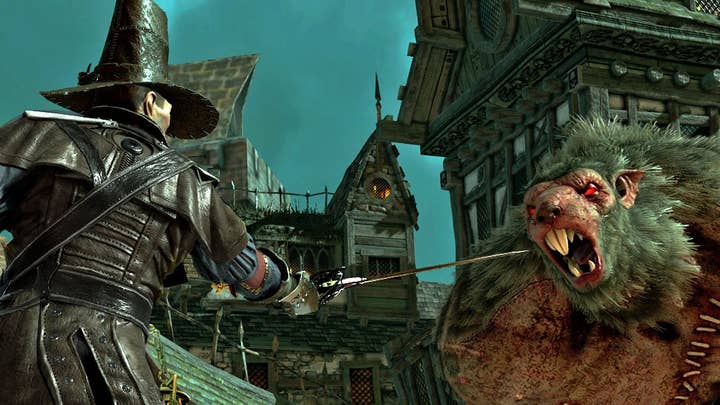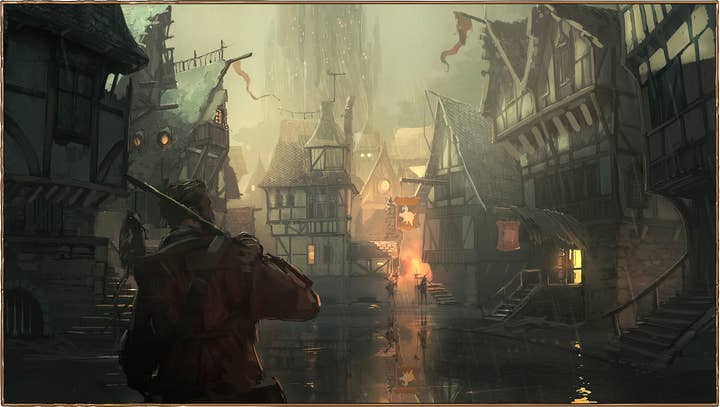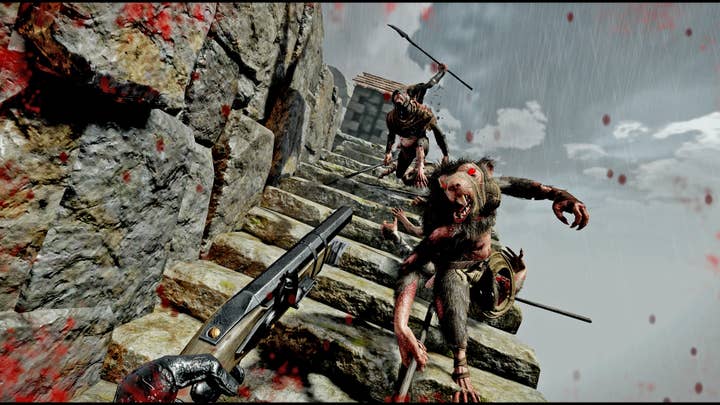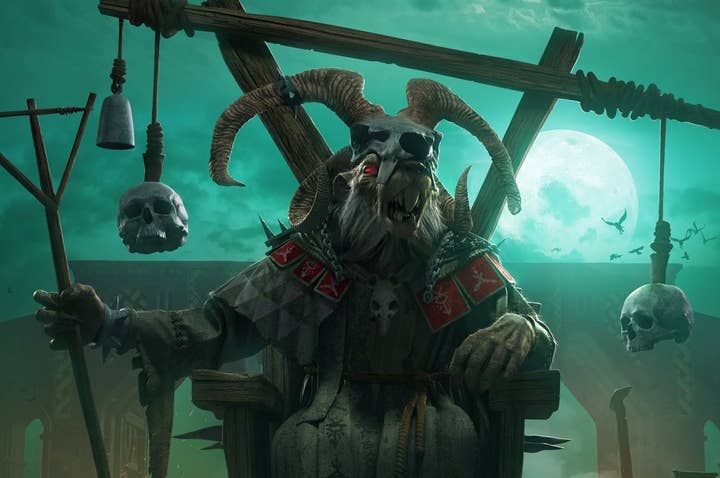"I think you need to work hard to get luck"
Fatshark CEO Martin Wahlund on the ups and downs of self-publishing Vermintide
It's fair to say that Fatshark has seen a bigger step change in the last twelve months than most professional Tango dancers see in their careers. The Stockholm-based gaming tech specialist is the brains behind the BitSquid game engine that has been used in a slew of games including War of the Roses and PS4 top-down shooter Helldivers, but as a games studio, it has also worked with publishers to create titles like Escape Dead Island, Bionic Commando Rearmed 2, and Cobalt.
Now, however, the company is pivoting on its heel. Last year saw the sale of BitSquid to Autodesk, and Fatshark is dipping its fins into the new waters of self-publishing.
It's a bold transformation, to be sure, but CEO Martin Wahlund believes that the labour of self-publishing bears great potential.
"As an indie developer the scary part is always breaking through and reaching out to gamers. We know we can do good games, but you're always afraid of no one playing them"
"As an indie developer the scary part is always breaking through and reaching out to gamers. We know we can do good games, but you're always afraid of no one playing them.
"One of the benefits of being indie and self-publishing is you can get closer to the players. There's no one between us and the fans basically."
This has been especially important in the running up to the launch of Fatshark's newest game. The studio has just whipped the cloak off Vermintide, an asymmetrical team shooter built on the Warhammer IP, featuring the giant rodent Skaven.
Without access to a publisher's marketing clout, Fatshark instead made its own publicity by reaching out directly to its existing fanbase and the Warhammer community.
"It's more like just making sure everything's ready for the launch, making sure we're prepared, looking at the forums and the community, ironing out the kinks, and making sure that everyone in the community's questions are asked," Wahlund explains, walking us through his company's well-oiled self-publishing machine.
A big part of that strategy revolved around streaming. In the week before launch, Wahlund claims that Vermintide was at one point the "second most streamed game, beaten only by League of Legends. We've been able to reach out, and it seems to be working."

Of course, there's a reason that publishers can be antsy about opening a game to prying eyes before it's ready. Early bugs and glitches can turn off potential players and alienate fans too impatient to wait for the corrected release. Wahlund, however, thinks it's worth the risk.
"We had a Beta and allowed people to stream," he says. "We know that we have bugs in the game, but it's so valuable to allow people to stream and get feedback. We can watch them play live and find out whether they have any issues - like understanding how to play the game, for example."
Nonetheless, Fatshark still put in a lot of legwork before releasing Vermintide to streamers.
"We had done a lot of testing - the first Beta only had 100 people playing and then we increased it every week. It's important to make sure when people play the game that there's not too many bugs, because otherwise people won't enjoy the game. To get valuable feedback you need to have a good game, which we had."
"It's not bugs that you want feedback on, but core gameplay mechanics and structure"
In other words, you want the game to physically be as polished as possible before launching into Beta. It's not bugs that you want feedback on, but core gameplay mechanics and structure.
Self-publishing has other pros and cons. Fatshark had been used to working with publishers, but with Vermintide the studio has had to do everything single handed. While that brings creative freedom, it also means that they are completely accountable for the game's quality.
From reaching out to PRs to setting up the game's store page, the buck stops with Fatshark. While publishers can provide a welcome scapegoat for poor development decisions or lacklustre quality, Wahlund knows that a self-publishing indie has nowhere to hide.
"The good part of a publisher is that they have a good knowledge of marketing and a lot of experience that they can bring into the game," he says. "The biggest benefit of publishing yourself is that you control the game in a better way."
One key aspect of that control is the scheduling. Self-publishing means that developers can dance to their own tune, whereas publishers might try to shoehorn release dates into the free slots on their own calendars.

"You control the release dates, which is huge because if we don't think the game is ready we don't need to release it," says the CEO. "With Vermintide we've been more agile in that way, and that has made it possible for us to wait for the best possible launch date.
"Sometimes when you're working with a publisher they'll have put the marketing machinery into play and they'll push really hard to ensure that your game is completely done. As a self-funded company we announced the game three weeks ago, which is five or six weeks before launch, just because we knew that we could."
Still, Wahlund believes there are even more benefits. "For us, because we were working with an IP like Warhammer, it could have been a danger to have too many stakeholders. I think if you want to do a really great game you need to have a clear path on what you want to do, and the more people who are involved in that process the more you get a sort of 'mean' of a design rather than going fully focussed in one direction.
"I think a lot of games can suffer from compromise. If the publisher and the developer are not on the same page at all times it can cause issues."
Still, a publisher can also bring laser focus to a project. So what was Fatshark's guiding strategy while developing Vermintide? For Wahlund, the answer is relatively simple.
"I think a lot of games can suffer from compromise. If the publisher and the developer are not on the same page at all times it can cause issues"
"The only thing we said when we started was that 'we need to make a great game.' It's not to make money, which sounds silly, and it shouldn't be to get famous. If you make a great game, people will love it and everything else comes from that. The only thing we can really affect is whether or not we make a great game. It could be a bit naive, but that's what worked for us."
Indeed, what has worked for Fatshark might not work for other indies. As independent developers go, the company is large at around 50 people, rather than the three to five which comprise many small studios. This means Fatshark has had more opportunities to do high-budget games, with Vermintide funded by selling BitSquid to Autodesk.
Fatshark is part of an indie community that is becoming increasingly complex. Under pressure from crowded stores and markets, is what it means to be an indie developer changing? The question makes Wahlund pause.
"What does it mean to be an indie developer? For a start you don't have a publisher and you'll be managing your own budget. But it's all changed now, because it's harder to reach out. Steam is more similar to the [mobile] app store than it was five years ago - most of the games released on Steam now are never seen [by players]."
Indeed, the halcyon days of Minecraft and Mike Bithell's Thomas Was Alone, where indie developers seemingly stumbled on a hit, are becoming increasingly distant. So much so, some people have even wondered whether the "lucky indie myth" still exists?
"I think you need to work hard to get luck. You need a portion of luck even if you're a big publisher"
"I think you need to work hard to get luck," Wahlund shrugs. "You need a portion of luck even if you're a big publisher. Like the movies, we are a hit driven industry. Today you're not just competing for people's money but for their time - time is a really scarce resource.
"So if you're an indie you need to do something that the big players can't do, where there's a gap in the market. Thomas Was Alone and Minecraft did well because they touched on a spot that no one had really done before. Obviously you need some luck to get the right people to play and write about the game. If you can get someone to write about your game, stream it on Twitch, or make a video about it on YouTube, the snowball starts to roll. Do you need luck? Of course. But you can also earn luck by making a great game. "
This mixture of self-made luck and genuine chance is essential to the recipe of self-publishing. Successful games aren't just grenades of profitability. You can't just make a great title and lob it over the wall where it will disrupt the market with a bang.

"If you do self-publishing you need to realise you're not just building a game, you need to market it as well," advises Wahlund. "I think a lot of people are always surprised by that, but you don't just build a game, you also have to get that game in front of people that can help to spread the word."
In other words, to be a successful self-publishing indie you've got to be willing to try something different. Small teams have the agility to experiment, while larger companies can capitalize on their community's clout.
"It's all about reaching through noise in the market and the joy of being close to players. You can be much more open about the game, and you don't have to put everything through some PR in the marketing department. Of course, sometimes we get it wrong and sometimes we get it right, but the important thing is to be humble and talk to people and be honest about the mistakes you make."
Vermintide has now had lift off, and while Fatshark hasn't ruled out working with publishers again in the future, it's certainly a confident step in a new direction.
